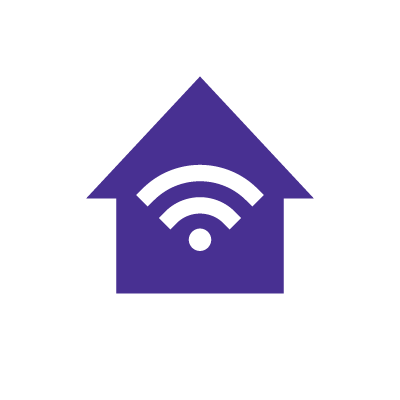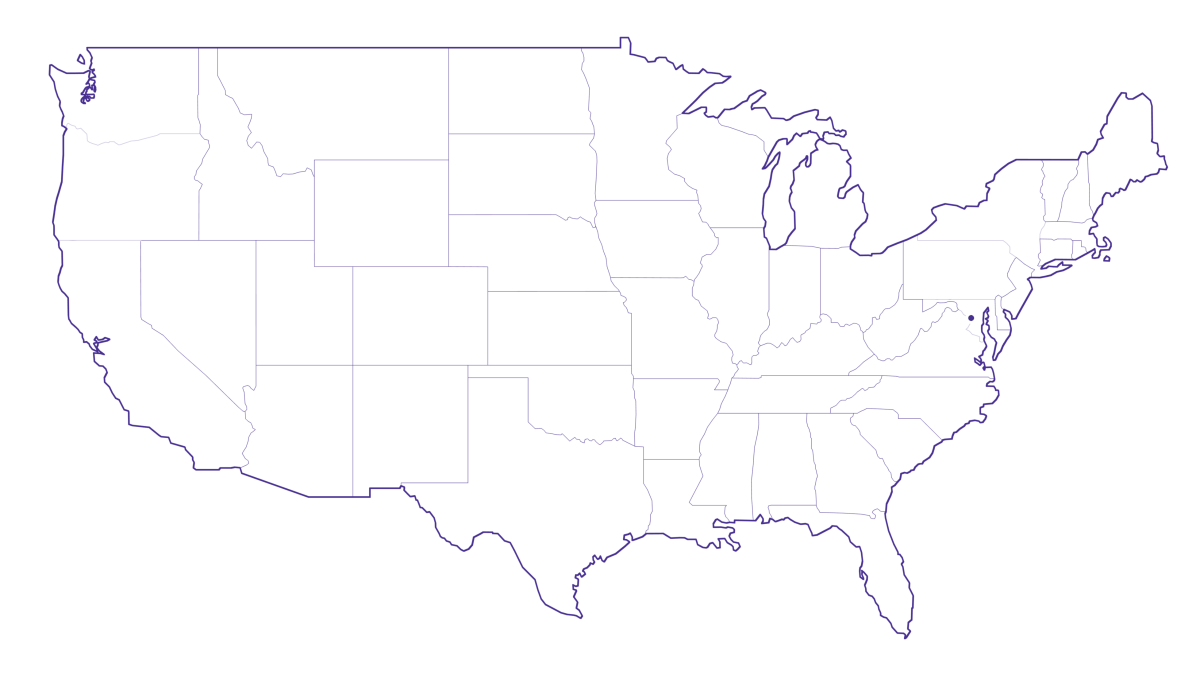Mesh WiFi vs WiFi extenders: What’s the difference?

If you’ve looked into improving your WiFi network or increasing your WiFi speed, you might have looked into mesh WiFi or WiFi extenders. While these two technologies have some similarities, they are very different in how they manage and optimize WiFi speed.
In this article, we’ll explain the differences between mesh WiFi and WiFi extenders
WiFi that just works!
WiFi plans for any home
Tiny, large or somewhere in between; find WiFi coverage to fit any space. Blanket your entire home with a fast and ultra‑reliable connection.

What is a WiFi extender?
How do WiFi extenders work? A WiFi extender, also known as a WiFi repeater or booster, is a device that extends the coverage area of a WiFi network. WiFi extenders work by receiving an existing WiFi signal, amplifying it and transmitting the boosted signal.
For someone in need of boosting weak signals or increasing network coverage in all areas of the home or office, a WiFi extender may provide benefits. Let’s take a look at what WiFi extenders are good for.
-
- Extending coverage: WiFi extenders bring coverage where the main router’s signal cannot reach, such as basements, attics or outdoor areas.
- Improving connectivity: WiFi extenders improve connectivity in areas with poor WiFi reception.
- Supporting more devices: Extenders can enable more devices to connect to the internet.
WiFi extenders may need to create a new network that devices must switch to manually. Typically, these extenders need to use half of the bandwidth available in order to communicate back to the router. This may slow down the connection.
If you are looking for a more seamless connection, a mesh network system may work better for your needs.

Mesh WiFi with
eero Secure
Enhanced Whole Home WiFi uses multiple routers (or eeros®) to boost range, speed, and stability, while eero Secure, included at no extra cost, offers parental controls, ad blocking, and internet backup for constant connectivity.
What is mesh WiFi?
How does mesh WiFi work? Mesh WiFi is a wireless networking technology that uses multiple router-like devices (or, nodes) to create a single, wide-ranging and seamless mesh WiFi network similar to eero mesh WiFi. Unlike traditional WiFi routers that broadcast WiFi from a single point, mesh WiFi systems leverage several access points.
Mesh WiFi vs. WiFi extenders
When choosing between mesh WiFi systems or WiFi extenders, remember that each has their own strengths and is optimized for different forms of networking.
Check out our comparison of WiFi extenders and mesh WiFi plans:
Coverage and performance
Mesh WiFi systems offer extensive, seamless coverage with consistent performance, while WiFi extenders can extend reach but often at the cost of reduced speed and increased network complexity.
- Mesh WiFi systems coverage and performance: Mesh WiFi systems provide seamless coverage throughout the home by eliminating dead zones and preventing signal loss. Mesh WiFi systems and their nodes provide consistent performance across the entire network, rerouting traffic to ensure the best speeds.
- WiFi extenders coverage and performance: WiFi extenders extend the reach of the existing router, but may create network overlap. Similarly, if your extender is very far from your main router, you may experience signal degradation. WiFi extenders need to access bandwidth for retransmitting, which may result in reductions of your available bandwidth.
Speed and stability
When comparing the stability and speed of mesh WiFi systems and WiFi extenders, consider how each technology impacts your overall network performance. Here’s a breakdown of what you can typically expect from each in terms of stability and speed:
Mesh WiFi systems
- Stability: Mesh systems are very stable. Mesh WiFi tech enables nodes to communicate with each other, ensuring that the network self-heals and re-routes data if a node goes offline or encounters interference. Dynamic adjustments, such as these, help maintain a stable connection throughout the home.
- Speed: Mesh WiFi systems maintain better network speeds because they can intelligently route traffic and are less likely to suffer from congestion. Most modern mesh systems support newer WiFi standards, such as WiFi 6 technology, which provide higher speeds and better handling of simultaneous connections.
WiFi extenders
- Stability: WiFi extenders may be less stable compared to mesh systems. They rely on the strength of the original signal from the router, and their performance can degrade with distance from the router. If the extender itself is poorly placed where the router’s signal is already weak, its extended network will also be weak and unstable.
- Speed: WiFi extenders can reduce speeds, especially as distance increases from the primary router. The farther a signal is extended, the slower it gets.
Set up and management
Setting up and managing a WiFi network can significantly affect user experience. Here’s how mesh WiFi systems and WiFi extenders compare in terms of setup and ongoing management:
Mesh WiFi systems
- Set-up: Mesh systems are known for their user-friendly setup processes. Most come with a dedicated mobile app that guides users through installation.
- Management: Once set up, mesh systems can be low-maintenance. The mobile app used for setup provides network management tools, allowing users to see which devices are connected, prioritize devices or applications, and update firmware automatically. Parental controls and guest network features are also commonly included and easy to activate. Mesh systems continuously monitor network health and can automatically switch devices between nodes to maintain the strongest connection, as well as provide security tools to help you protect your network.
WiFi extenders
- Set-up: Setting up WiFi extenders may be a bit more complex than mesh systems. Extenders need to be placed within a good range of the router to receive a strong signal but also far enough away to extend the network’s reach.
- Management: Managing extenders can be more hands-on compared to mesh systems. Extenders often create a separate network SSID, which can require manual switching between networks as you move around your home. They may also require periodic reconfiguration if the primary router’s settings change or if there are issues with signal overlap or interference.
Whether you decide to use a WiFi extender or a WiFi mesh network, make sure to take steps to secure your WiFi.

eero Plus
eero Plus protects your family online with a password manager to safely create, store and share passwords, virus and malware protection and a VPN that lets you browse the web safely and securely.
Why you should choose the eero mesh WiFi over traditional extenders
Choosing an eero mesh WiFi system over traditional WiFi extenders for your home network provides several significant advantages, particularly in terms of performance, security, ease of use and scalability.
If you want better WiFi performance, use a mesh network to distribute strong, stable WiFi throughout your home. Unlike traditional extenders, which can degrade signal strength and speed during re-broadcasting, eero’s mesh technology ensures that each node communicates with the router, optimizing data paths and reducing congestion.
By using the eero app when installing, you’ll be able to set up an entire system to position your nodes for optimal coverage. After placement, you’ll be able to continually manage your network, prioritize devices, create guest access and monitor parental controls from your smartphone.
Astound’s Whole Home WiFi eero subscription includes eero Secure, which has parental controls, ad blocking and internet backup included, at no additional cost.
If you want to invest more in your home network, adding more nodes is simple. Plug them in and let the app integrate them with your existing network. You’ll be able to extend coverage to new areas of your home or enhance capacity as you add more devices, something that traditional extenders struggle with.
Conclusion
So, is mesh WiFi really better? When deciding between mesh WiFi systems or WiFi extenders for enhancing your home network, each option serves different needs.
WiFi extenders can be a cost-effective solution for extending your existing router to hard-to-reach areas, with potential reductions in speed and signal strength. However, if you want an easy-to-manage WiFi experience, mesh WiFi systems, like eero, offer more advantages.
Mesh systems provide extensive and seamless coverage, superior performance and the convenience of a single network that supports smooth device transitions without the need to switch networks manually.
Furthermore, with their self-managing capabilities and scalability, mesh WiFi systems can accommodate a growing number of devices and increasing connectivity demands.
While WiFi extenders have their place, the continuous evolution and benefits of mesh WiFi systems make them the smarter and more reliable choice for comprehensive whole home WiFi solutions.
Switch & save
Astound is the #1 cable ISP
Stream live content, work, surf, game and connect to multiple devices with speeds up to 1500* Mbps through our ultra‑reliable fiber‑powered network.*

Frequently asked questions
What is the downside of a WiFi extender?
As WiFi extenders retransmit data between routers and devices, they can reduce internet speeds and increase latency.
Is it worth upgrading to mesh WiFi?
Yes. Upgrading to a mesh WiFi system can be worthwhile if you need consistent, reliable coverage across a large or multi-story space, as it provides more coverage, fewer dead zones and better connectivity compared to a traditional router or WiFi extender.
Is mesh just a repeater?
No. A repeater simply extends coverage; mesh systems use interconnected nodes to create a seamless and stable WiFi network in your space. With mesh, devices automatically connect to the strongest signal, offering better performance and simpler network management.
Does mesh WiFi increase ping?
Compared to traditional WiFi setups, mesh WiFi systems can actually minimize ping or latency when connecting to the nearest node.
Does mesh WiFi increase the number of devices?
Depending on the size of your home, mesh WiFi can increase the number of mesh WiFi devices or nodes, needed to create a comprehensive network. In terms of device capacity, mesh WiFi systems can handle more devices more effectively than traditional routers due to their ability to distribute the network load across multiple nodes.
Does a WiFi extender reduce speed?
Yes, a WiFi extender may reduce speed, particularly when the extender communicates with the router on the same frequency band.
Create your perfect internet plan
Get the internet speed, WiFi, TV and mobile that’s just right for you.
*Internet speeds may vary & are not guaranteed. Certain equipment may be required to reach advertised speeds. DOCSIS 3.1 modem with 2.5GE physical LAN port is required for 1 Gigabit speeds and higher. See astound.com/yourspeed for why speeds may vary. To view Astound’s FCC Network Management Disclosure see astound.com/policies-disclaimers. Limited time offer, subject to change without notice. Advertised promotional price valid for duration of the stated promotional period from time of service activation. Regular rates apply after promotional period ends. Equipment not included and is extra. Modem required for Internet service. Enhanced Wi-Fi or Whole Home Wi-Fi (eero) not included and is add’l. Offer includes a monthly discount for enrollment in both automatic payments (autopay) & paperless billing (e-bill). Discount of $10 applies with automated bank account deduction or a discount of $5 applies with automated credit/debit card payment. Valid email address required. Must complete enrollment in autopay and e-bill within 30-days of placing the order. Without enrollment, the discount does not apply. Discount appears on bill within 3 bill cycles after enrolling. If either autopay or e-bill is canceled, services are changed, or the account is not in good standing, then the monthly discount will be discontinued. Offer valid only for new residential Astound customers or previous customers with an account in good standing who have not had Astound service within the last 60 days. Any add’l services, equipment, premium channels & other tiers of service are subject to an add’l charge & regular increases. A one-time activation fee of $14.99 (in addition to any installation fees) will be charged & is subject to change. Add’l fees apply for taxes & surcharges, and are subject to change. WA RESIDENTS: unless otherwise specified, price does not include a 2% Regulatory Administration Fee. For details about taxes, fees & surcharges visit astound.com/fees. No early termination fees apply in the event service is terminated in advance of the promotional end date. Customer is responsible for any accrued service charges in the event service is canceled. Subject to credit check. Not all services & speeds are available in all areas. A multi-product discount may be available to qualifying addresses with a subscription to mobile, TV, and 600 Mbps Internet or higher. Discounts will be reflected in your order cart at time of purchase, if available. Other restrictions may apply. All services are governed by the Astound Customer Terms & Conditions that can be found at astound.com/policies-disclaimers. © 2025 Radiate HoldCo, LLC d/b/a Astound Broadband. All rights reserved.
While we have made every attempt to ensure that the information contained in this site has been obtained from reliable sources, Astound is not responsible for any errors or omissions, or for the results obtained from the use of this information. All information in this site is provided “as is”, with no guarantee of completeness, accuracy, timeliness and without warranty of any kind, express or implied, including, but not limited to warranties of performance, merchantability and fitness for a particular purpose. Certain links in this site connect to other websites maintained by third parties over whom Astound has no control. Astound makes no representations as to the accuracy or any other aspect of information contained in other websites.
eero Plus is available for an additional $9.99/month and requires subscription to whole home WiFi powered by eero.

















